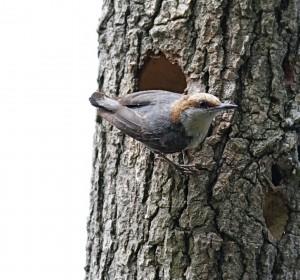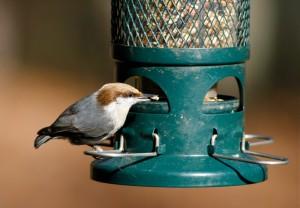Putting up nest boxes is an effective way to help cavity-nesting birds, and golf courses have been hosting nest boxes for the Eastern Bluebird for decades, contributing to the stunning comeback of this species. Now, North Carolina golf courses are putting up another kind of nest box – this one for the Brown-headed Nuthatch, a North Carolina native.
From research performed by Dr. Mark Stanback of Davidson College, and because the Brown-headed Nuthatch weighs only one-third of the weight of a bluebird, we know that nuthatches require a smaller hole in their nest boxes. Dr. Stanback, who has been studying the Brown-headed Nuthatch for six years, was surprised at just how many nuthatches built nests in the 110 boxes he installed on golf courses in Pinehurst and Charlotte one year ago. All boxes have 1-inch holes - noticeably smaller than the standard bluebird hole size of 1 1/2 inches.
He was delighted by the results: 74 percent of the boxes were occupied by Brown-headed Nuthatches! Twenty-one percent contained Carolina Chickadee nests, and just five percent were vacant.
All of the boxes are on golf courses with large pine trees, which provide an important food for nuthatches - pine seeds. The Brown-headed Nuthatch is thought to require old-growth pine forests, but Dr. Stanback's work shows that so long as large pines are in the vicinity, nest box hole size is a far better predictor of nuthatch presence than pine tree density.
Five golf courses in the Pinehurst area are now participating in Dr. Stanback’s study: both courses of the Country Club of North Carolina, the National Golf Club, and Pinehurst No. 6 and No. 8. In the Charlotte area, Carmel Country Club and Pine Island Country Club are participating, and this past fall, Dr. Stanback put up an additional 80 boxes at Pinehurst-area golf courses.
Across the Brown-headed Nuthatch's range, from Maryland to east Texas, it has declined over the past 40 years. Though it has increased in North Carolina over the past 10 years, Audubon, Partners in Flight and the NC Wildlife Resources Commission consider it a responsibility species because North Carolina is home to 14 percent of the global population. Logging, fire suppression and development - all of which make scarce the well-decayed dead trees where nuthatches like to build nest cavities - will continue to limit natural cavities.
As Dr. Stanback's research demonstrates, bluebird competition for nest boxes is also a threat to the Brown-headed Nuthatch, but is easily solved by providing small-hole boxes (1 and 1/8 inch holes) for nuthatches alongside bluebird nest boxes (1 1/2 inch holes), as long as they are at least 30 feet apart.
Dr. Stanback is advising Audubon North Carolina's Bird-Friendly Communities partnership program, which has set a goal of installing 10,000 new Brown-headed Nuthatch nest boxes in North Carolina by 2015. Audubon is reaching out to citizens to participate in installing nest boxes across the state, and to then monitor the boxes for success – meaning baby nuthatches are born and surviving to leave the nest or fledge.
How to Participate in the Nest Boxes for Nuthatches Initiative
- Build or purchase nest boxes for your yard- If you live in the Triad, stop by the Wildlife Resources Commission office at 1751 Varsity Drive in Raleigh to purchase a box. Or contact these Audubon North Carolina chapters: Wake Audubon, New Hope Audubon, Mecklenburg Audubon, Forsyth Audubon, T. Gilbert Pearson Audubon and Cape Fear Audubon. Contact information can be found on the Audubon North Carolina website.
- Convert an existing bluebird nest box: Email nuthatch@audubon.org with your mailing address to receive a free metal plate adapter with a 1-inch hole, or purchase a plate at your local bird store. Attach it to a standard bluebird box, available at many State Employee Credit Union locations, and voila - you have a nuthatch box!
- Build your own box: Plans can be found on the Audubon North Carolina website.
Put Up Your Nest Box and Then Tell Us About Your New Neighbors
Register your Nuthatch Nest Box. When you register, we'll send you more fun facts about nuthatches and other backyard birds, and you’ll have the opportunity to join a citizen-science nest watch program to help us gather data about how your efforts are helping nuthatches survive and thrive.
- Join Nest Boxes for Nuthatches to receive regular updates
- Register your Nuthatch Nest Box
- Upload your photos to our Facebook page
- Share with us on Twitter and use the hashtag #Home4Nuthatches
- Instagram a photo and use the hashtag #Home4Nuthatches





